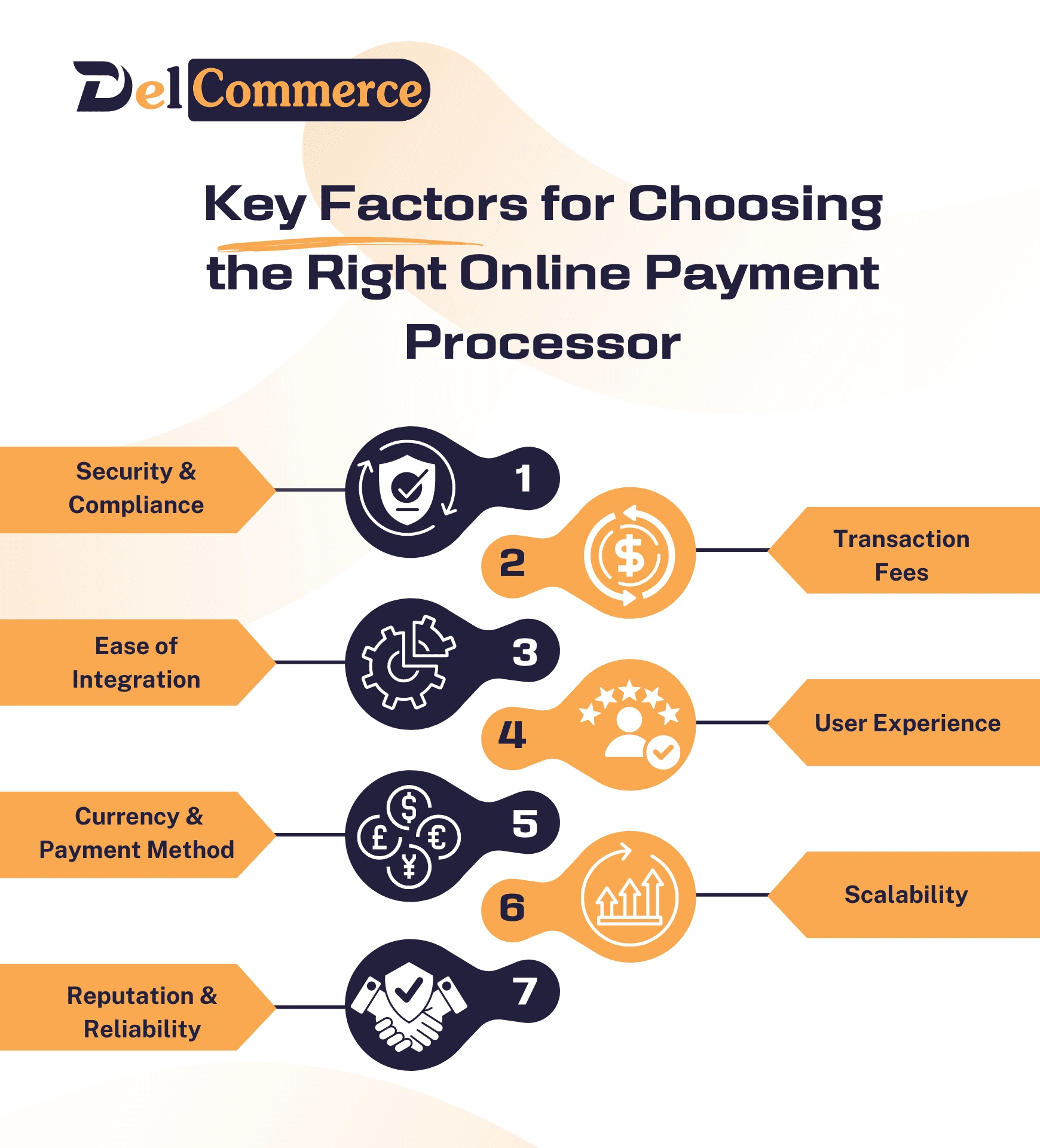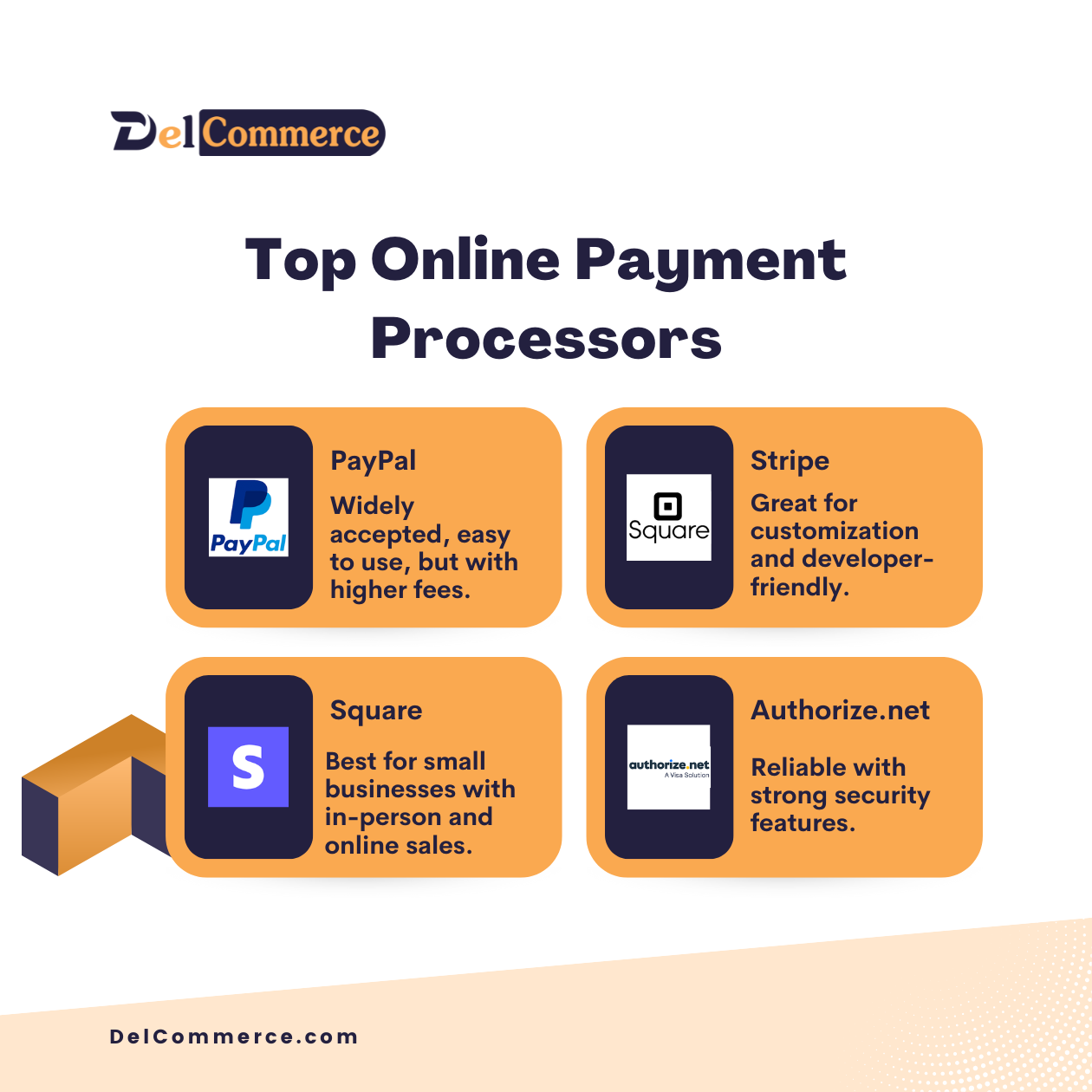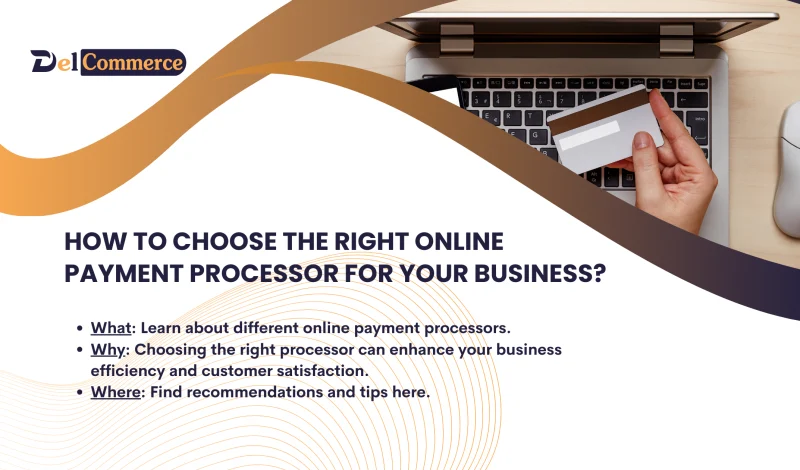In today’s digital-first world, the success of any business—whether it’s a small startup or a large enterprise—hinges on its ability to manage online transactions efficiently. With e-commerce booming and more customers preferring the convenience of digital payments, having a reliable online payment processor is not just an option; it’s a necessity. But with so many options available, how do you determine which payment processor is the best fit for your business?
This comprehensive guide will walk you through the essential factors to consider when selecting an online payment processor, compare some of the top contenders, and offer actionable insights to help you make an informed decision. By the end of this post, you’ll have a clear understanding of which payment processor aligns with your business needs and goals.
What Is an Online Payment Processor?
Before diving into the decision-making process, it’s crucial to understand what an online payment processor is and how it functions within your business ecosystem. An online payment processor is a service that manages transactions between your business and your customers. It acts as the intermediary, ensuring that funds are securely transferred from the customer’s bank or credit card account to your business account. In doing so, it handles sensitive information, such as credit card numbers, and ensures compliance with various security standards.
In essence, the payment processor is the engine that drives your online sales, making it a critical component of your e-commerce strategy.
Why Is Choosing the Right Online Payment Processor Important?
Selecting the right payment processor is about more than just handling transactions. It’s about providing a seamless and secure experience for your customers, ensuring your business operates efficiently, and minimizing costs associated with payment processing. A poorly chosen payment processor can lead to higher fees, security vulnerabilities, and a frustrating user experience, all of which can negatively impact your business.
Moreover, as your business grows and expands into new markets, your payment processor needs to scale with you. It should support various currencies, payment methods, and regional regulations, allowing you to cater to a global audience without hiccups.

Key Factors to Consider When Choosing an Online Payment Processor
To help you navigate the crowded landscape of payment processors, we’ve identified several key factors you should consider when making your choice.
1. Security and Compliance
Security should be your top priority when choosing a payment processor. Customers are entrusting your business with sensitive financial information, and any breach of this trust can result in severe consequences, both financially and reputationally. Therefore, you need to ensure that your payment processor is compliant with industry security standards, such as PCI-DSS (Payment Card Industry Data Security Standard).
Look for processors that offer advanced security features like encryption, tokenization, and fraud detection tools. Encryption ensures that data is transmitted securely, while tokenization replaces sensitive information with a token that is useless if intercepted. Fraud detection tools can help identify and prevent suspicious transactions before they occur.
Additionally, make sure the processor has a proven track record of handling security incidents responsibly. This includes transparent communication in the event of a breach and a solid plan to mitigate damage.
2. Transaction Fees and Cost Structure
Transaction fees are an inevitable part of using a payment processor, but the structure and amount of these fees can vary widely. Typically, processors charge either a flat rate per transaction or a percentage of the transaction amount. Some may also impose monthly fees, setup fees, or additional costs for specific services, such as chargebacks or cross-border transactions.
It’s essential to carefully review the fee structure and consider how it aligns with your business model. For instance, if you’re a high-volume seller with many small transactions, a processor with low per-transaction fees might be more cost-effective. Conversely, if you sell high-ticket items, a processor that charges a lower percentage might be more advantageous.
Remember to also consider any hidden fees, such as those for early contract termination or monthly minimums. These can add up over time and impact your overall profitability.
3. Ease of Integration
Your payment processor should integrate smoothly with your existing systems, including your e-commerce platform, CRM, and accounting software. A payment processor that’s difficult to integrate can cause delays, increase costs, and create unnecessary headaches.
Look for processors that offer a range of integration options, such as plugins for popular platforms (e.g., Shopify, WooCommerce), APIs for custom integrations, and compatibility with various POS systems. This flexibility will allow you to implement the payment processing solution that best fits your operational needs.
Moreover, the integration process should be well-documented and supported by the processor. This ensures that your development team can quickly and efficiently set up the system, minimizing downtime and reducing the risk of errors.
4. User Experience and Customer Support
The payment process is one of the most critical touchpoints in the customer journey. A complicated or frustrating checkout process can lead to cart abandonment, while a smooth and intuitive experience can enhance customer satisfaction and encourage repeat business.
When evaluating payment processors, consider the user experience they offer. Features such as a clean interface, mobile optimization, and support for various payment methods (credit/debit cards, digital wallets, etc.) can make a significant difference. Additionally, features like one-click payments and saved payment information can streamline the process for returning customers.
Equally important is the level of customer support provided by the processor. In the event of a problem, you need to know that you can quickly reach a knowledgeable support team. Look for processors that offer 24/7 support through multiple channels (e.g., phone, email, live chat) and have a reputation for responsive and helpful service.
5. Support for Multiple Currencies and Payment Methods
If your business operates internationally or plans to expand into global markets, it’s essential to choose a payment processor that supports multiple currencies and payment methods. This capability will allow you to cater to a broader audience and provide a seamless payment experience for customers around the world.
Consider the currencies and payment methods most popular in your target markets. For instance, in Europe, you may need support for SEPA direct debits, while in Asia, local payment methods like Alipay or WeChat Pay might be crucial. Additionally, ensure that the processor offers competitive exchange rates and low fees for currency conversion, as these costs can add up quickly.
6. Scalability
As your business grows, your payment processor needs to scale with you. This means not only handling an increasing volume of transactions but also offering features that support your expanding needs, such as advanced reporting, customizable payment flows, and support for new markets or products.
Scalability also involves the processor’s ability to innovate and adapt to changing industry trends. For example, as digital wallets and cryptocurrencies become more prevalent, your processor should be able to support these new payment methods. Choosing a processor with a strong track record of innovation can help future-proof your business.
7. Reputation and Reliability
Finally, consider the reputation and reliability of the payment processor. How long has the company been in business? What do other businesses say about their experiences with the processor? A well-established company with positive reviews is more likely to provide a stable and reliable service.
Reliability also extends to the uptime and speed of the payment processor. Frequent outages or slow processing times can disrupt your business operations and frustrate customers. Look for a processor with a proven track record of high uptime and fast transaction processing.

Comparing Popular Online Payment Processors
Now that you know what to look for, let’s compare some of the most popular online payment processors to see how they measure up.
1. PayPal
PayPal is one of the most widely recognized and trusted online payment processors in the world. It’s known for its ease of use and broad acceptance, making it a popular choice for businesses of all sizes. PayPal supports a wide range of payment methods, including credit cards, debit cards, and PayPal accounts.
Pros:
- User-friendly interface that’s easy to set up and use.
- Supports multiple currencies and payment methods.
- Strong security features, including encryption and fraud detection.
- Trusted by millions of users worldwide.
Cons:
- Higher fees compared to some other processors, especially for international transactions.
- Limited customization options for businesses with specific needs.
- Customer support can be slow to respond to issues.
PayPal is an excellent choice for businesses that value ease of use and global reach, but it may not be the most cost-effective option for high-volume or international transactions.
2. Stripe
Stripe is a developer-friendly payment processor that offers extensive customization options. It’s known for its robust API, which allows businesses to create a highly tailored payment experience. Stripe supports multiple currencies and payment methods, making it a great choice for businesses with global reach.
Pros:
- Highly customizable with extensive API support.
- Supports over 135 currencies and a wide range of payment methods.
- Advanced security features, including encryption and tokenization.
- Transparent pricing with no hidden fees.
Cons:
- May require technical expertise to fully implement and customize.
- Customer support is primarily email-based, which may not be sufficient for urgent issues.
- Fees for additional services, such as chargebacks, can add up.
Stripe is ideal for tech-savvy businesses that need a flexible and scalable payment processing solution, particularly those with international operations.
3. Square
Square is a versatile payment processor that serves both online and in-person transactions. It offers a range of tools for small businesses, including a POS system, invoicing, and inventory management. Square’s fees are straightforward, with a flat rate per transaction.
Pros:
- Simple, flat-rate pricing with no hidden fees.
- Integrates seamlessly with Square’s POS system and other tools.
- User-friendly interface that’s easy to set up and use.
- Robust reporting and analytics features.
Cons:
- Limited support for international transactions and currencies.
- Some advanced features require additional fees or subscriptions.
- Customer support is primarily available during business hours, which may be a limitation for businesses operating in different time zones.
Square is an excellent choice for small to medium-sized businesses that need a comprehensive payment solution that works both online and in person.
4. Authorize.Net
Authorize.Net is a well-established payment processor with over two decades of experience in the industry. It offers a wide range of features, including recurring billing, fraud detection, and mobile payments. Authorize.Net is a solid choice for businesses that require a stable and feature-rich payment processor.
Pros:
- Extensive features, including recurring billing and advanced fraud detection.
- High level of customization and flexibility.
- Reliable and trusted by thousands of businesses.
- Supports a wide range of payment methods and currencies.
Cons:
- Complex fee structure with various additional costs.
- May require technical expertise to implement and customize.
- Customer support can be inconsistent in quality.
Authorize.Net is ideal for businesses that need a robust and customizable payment processing solution, particularly those with specific industry requirements.
5. Adyen
Adyen is a global payment processor that supports over 250 payment methods and 150 currencies. It’s used by large enterprises like Uber and Netflix, but it’s also accessible to smaller businesses. Adyen offers advanced fraud prevention tools and a high level of customization.
Pros:
- Extensive support for multiple payment methods and currencies.
- Advanced fraud detection and security features.
- Scalable and flexible, suitable for businesses of all sizes.
- Transparent pricing with no hidden fees.
Cons:
- May be too complex for small businesses or those without technical expertise.
- Fees for certain services can be higher than other processors.
- Customer support is primarily available in specific regions, which may be a limitation for global businesses.
Adyen is an excellent choice for large or rapidly growing businesses that require a global payment solution with advanced features.
Making the Right Choice for Your Business
The best online payment processor for your business depends on your specific needs, goals, and operational requirements. Here are some scenarios to help guide your decision:
- Small Businesses or Startups: If you’re just starting, you might prioritize ease of use, low setup costs, and a processor that can grow with you. PayPal or Square could be good options due to their simplicity, straightforward pricing, and broad acceptance.
- Tech-Savvy Businesses: If you have the technical resources to customize your payment processing system, Stripe offers unparalleled flexibility and integration options. It’s ideal for businesses that need a tailored payment experience and support for multiple currencies and payment methods.
- Global Businesses: For businesses that operate internationally, Adyen or Stripe might be the best choice due to their extensive support for multiple currencies, payment methods, and advanced security features. These processors can help you scale globally without compromising on user experience or security.
- Established Enterprises: If your business is well-established and requires a feature-rich, customizable solution, Authorize.Net offers a comprehensive suite of tools that can handle complex payment needs, including recurring billing and advanced fraud detection.
Conclusion: Choosing Wisely for Long-Term Success
Selecting the right online payment processor is a critical decision that can significantly impact your business’s success. By carefully considering factors like security, fees, ease of integration, and customer support, you can choose a payment processor that aligns with your business’s goals and provides a seamless experience for your customers.
At DelCommerce, we’re committed to helping you navigate the complexities of online business. Whether you’re just starting or looking to scale your operations, choosing the right tools and partners is essential. If you have any questions or need further assistance in selecting the best payment processor for your business, feel free to reach out to our team.



